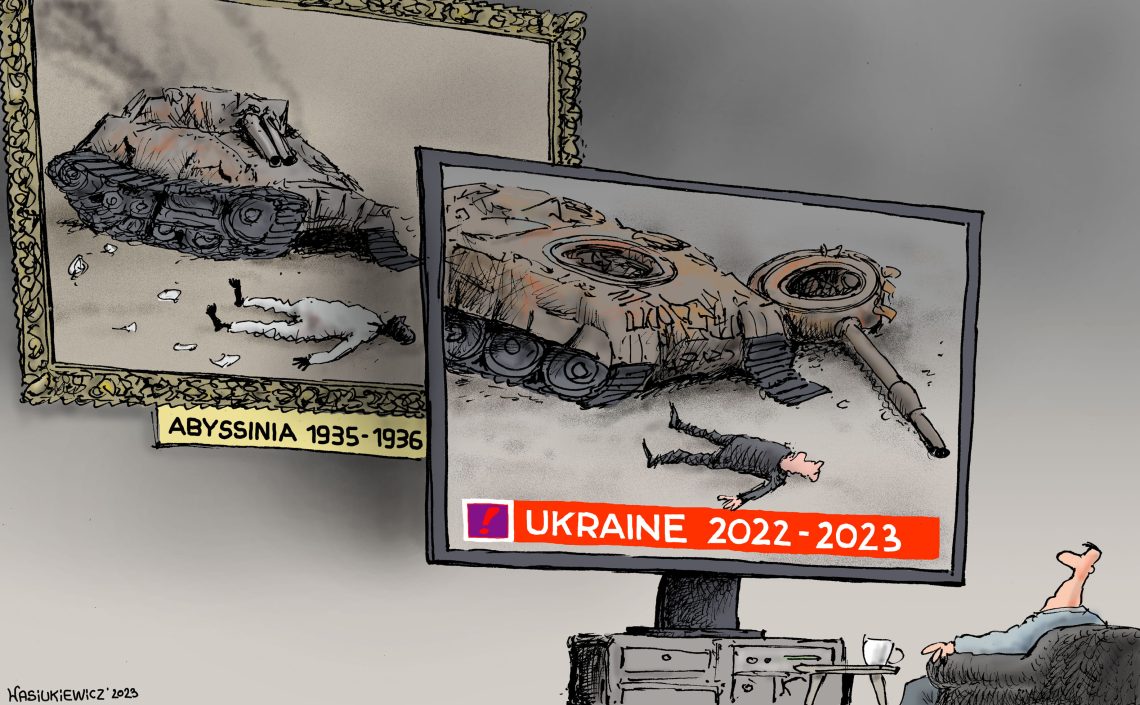From Abyssinia to Ukraine
Western leaders undermined Abyssinia’s brave struggle against Italy in 1935. They must not make the same mistake with Ukraine.

Throughout the colonial period, Abyssinia (known by its inhabitants as the Ethiopian Empire) remained the only country in Africa that was not colonized by any European power. Despite Italy having established colonies in Eritrea and Somalia, which both bordered Abyssinia, the country managed to resist Italy’s attempts to conquer it toward the end of the 19th century.
In 1935, Italian dictator Benito Mussolini, who dreamt of making his country a global power, wanted to bring Abyssinia into the colonial fold and prepared to invade. Abyssinia protested the aggression at the League of Nations, which imposed sanctions on Italy. Led by their brave and charismatic emperor, Haile Selassie, the Abyssinians were determined to resist the invasion.
The strongest European powers supported the League of Nations in its efforts to maintain peace and stability in the region. However, the United Kingdom’s and France’s backing was lukewarm. They were afraid of Germany, which was growing more assertive, and therefore looked to appease Mussolini.
Ukraine: Commentary and Analysis
Ukraine in Focus
Ukraine in Focus provides commentary on the conflict and outlooks for various facets of the crisis. GIS Founder and Chairman Prince Michael of Liechtenstein explores the long-term view in detailed scenarios for Europe and beyond.
The British foreign secretary at the time, Sir Samuel Hoare, was a career diplomat with a background in intelligence. In fact, during World War I, Hoare had given financial support to Mussolini, who was then a journalist, to promote extreme Italian nationalism against the Austrian empire. Hoare’s counterpart in France was Pierre Laval, who was also prime minister.
Together, they secretly negotiated the Hoare-Laval Pact, which proposed to cede a large part of Abyssinia’s territory to Italy. However, news of the pact sparked outrage in the UK, especially as Hoare had recently delivered a passionate speech in support of Abyssinia’s territorial integrity at the League of Nations. As a result, Hoare was forced to resign from his position.
Nevertheless, Italy had already been emboldened. It defeated Abyssinia using savage brutality and chemical weapons.
This episode marked the beginning of the end of the League of Nations’ influence and led to the rapprochement between the fascist Italian government and the German Nazis, a factor in the start of World War II. Mussolini cynically quipped, “The League is very well when sparrows shout but no good at all when eagles fall out.” Unfortunately, he was not mistaken.
Parallels with Ukraine
It is worth keeping this sad story in mind when considering what is happening now in Ukraine, where, again, an independent state is being attacked by a much stronger power.
The Ukrainian people have demonstrated their readiness to fight, and this determination is the best affirmation of Ukraine’s legitimacy as a free and independent nation. It puts to rest any debate as to whether Ukraine has always been a nation or merely emerged after the dissolution of the Soviet Union. This is undoubtedly a source of frustration for Russia. Even in the unlikely event that Russia were to achieve military victory, it would inevitably inherit a country filled with resistance and face a protracted guerilla war.
But it is also the West’s responsibility to prevent that outcome. Encouragingly, more and more Europeans seem to understand how important it is to support Kyiv. This trend is largely due to people’s admiration for Ukraine’s brave struggle. Moreover, Moscow’s brutal atrocities render any excuses meant to legitimize Russia’s actions – such as protecting its security interests against an assertive West – obsolete.
So far, the United States government and the lion’s share of its population favor giving Ukraine strong support. When one country delivers weapons to another during times of war, it is crucial that the country providing the arms has a clear strategy for what it wants to achieve. The U.S. and Western Europe want Ukraine to remain independent. But aside from that, are there clear, well-defined objectives?
More from GIS on Ukraine
Beyond Russia’s war against Ukraine
Ukraine’s strategic communication in the war with Russia
Ensuring Ukraine’s postwar security
Ukraine currently sees victory as permanently pushing Russia back to the borders established in 1991. NATO has expressed a similar sentiment, albeit using less explicit language. But what does victory mean in various capitals, especially if pushing Russia back becomes increasingly difficult or if the conflict evolves into a war of attrition? What would they say if Russia manages to regain territory – an eventuality that cannot be excluded, given the reluctant manner in which offensive weapons are being provided to Kyiv?
It would be interesting to know what Berlin’s, Paris’s and London’s real strategic goals are if push came to shove.
The most crucial decisions will be made in Washington. But much of Washington’s attention and interests are also focused on the Pacific.
For now, Kyiv is like a Mecca for Western politicians who want to show their support for Ukraine by getting a photo op with President Volodymyr Zelenskiy. But that political calculation could change at the drop of a hat. Western leadership must ensure that this time, there is no Hoare-Laval Pact equivalent.
The Allied Powers’ imposition of harsh conditions on Germany, Austria, Hungary and Turkey after World War I set the stage for World War II. As the war drew to a close, British diplomat Lord Robert Cecil and South African Prime Minister Jan Smuts proposed the creation of the League of Nations, primarily in response to the greed and shortsightedness demonstrated by the governments of France, Britain and Italy. The League was established as a framework for discussion aimed at preventing large-scale conflicts.
The current situation is bringing an end not only to the so-called rule-based world order but also to the previously stable coexistence that was established during the Cold War. Bold declarations such as “we will not allow a single inch of Ukrainian territory to be lost” must be backed by well-defined strategies, both immediate and long-term, including plans for postwar reconstruction. Otherwise, such statements risk echoing Hoare’s speech at the League of Nations just a few months before he entered into the ill-fated pact with Laval.
Developing well-defined objectives for both ending the war and the postwar conditions is essential. Political strategies must be devised to navigate a new global framework in a multipolar world. It is often repeated that the objective is to weaken Russia to the point where it will never attempt to engage in aggressive actions again. That is a dangerous, short-term goal that is unlikely to succeed and could even backfire. Similar efforts to weaken Germany after World War I ultimately failed. Instead, the West should focus on ensuring a free Ukraine and creating a credible defense, both within Europe and NATO, that will dissuade even a powerful Russia from future aggression.
Hollow pronouncements, like German Chancellor Olaf Scholz’s declaration of a “Zeitenwende,” or turning point in history, do not help much. European countries need to understand that geopolitics is back. They must recognize that foreign policy and diplomacy rely not only on soft power, but also the “big stick” of a strong, efficient, credible military deterrent.



